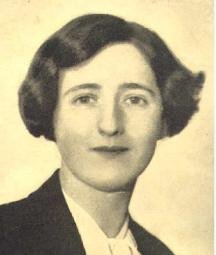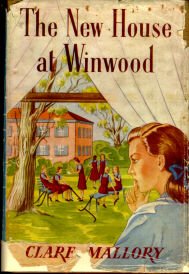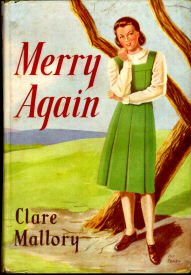 |
Clare Mallory
Page finalised 5th November, 2010.
Just ONE page on the Collecting Books and Magazines
web site, based
in Australia.
BOOK LISTING | CLARE MALLORY by Andrea Watson | READERS write
'CLARE
MALLORY' was a pseudonym of New Zealand author Winifred
McQuilkan, who was born at Invercargill, New
Zealand and educated at the Southland Girls’ High
School and Otago University in Dunedin. She completed her
education at Oxford University, England. On her return to
New Zealand she became headmistress of Columbia College,
Dunedin, until her marriage six years later.
|
During World War 2, working parties were
held at the school to assemble parcels to send to England.
Winifred, unable to find stories that would interest the girls
(most at the school having been read many times), began making up
stories about a group of girls in a similar boarding school.
These adventures would eventually become the MERRY series and would be avidly followed by both
Australian and New Zealand schoolgirls. Merry was, according to
her author, her most popular character: 90% of all letters she
received from readers were requests for more MERRY, or questions about the character.
In the 1960s, Winifred lived in Wellington,
New Zealand, where she was working (on her own admission) on Merry in Australia. This was never, to our knowledge, published. If
anyone knows why, or has more information about this author, we
would appreciate hearing from you.
During the 1940s, when few intelligent
girls' school stories were being published, 'Clare
Mallory’s' novels stood out due to their mature content: the
books questioned the morality of unreasoned demands for
discipline within the school system and the rights of
unquestioned authority.
Self-discipline was seen as one of the
chief aims of the modern school system, rather than such
discipline being imposed by outside forces. Although Clare
Mallory's earlier books dealt with boarding schools, she
introduced day schools into two 1950s novels: Leith and Friends and The
Pen and Pencil Girls. The
latter story involves the adventures of a group of girls who form
a STORY CLUB. These girls soon discover that the
best writing comes from personal experience rather than from
following fashions of the day.
 |
The
Winifred McQuilkan photo above was taken from the
dustwrapper of
The New House at Winwood. |
 |
THE
NOVELS
| Juliet Overseas,
1949 League of
the Smallest, 1951
Leith and Friends, 1950
Merry Again, 1947
Merry Begins, 1947
|
Merry Marches n,
1947 New House
at Winwood, 1949
Pen & Pencil Girls, 1948
Tony against the Prefects, 1949
Two Linties, 1950
|
References:
THE OXFORD HISTORY OF NEW ZEALAND LITERATURE
THE SINGING ROADS. A GUIDE TO AUSTRALIAN CHILDREN’S AUTHORS
AND ILLUSTRATORS, BY HUGH ANDERSON
Clare
Mallory by
Andrea Watson
Originally
appeared in Otago Daily Times in Dunedin, New Zealand
Writing schoolgirl fiction was not
the preserve of overseas authors. Dunedin has its own connection
to the genre through the books of Clare Mallory, the pseudonym of
author Winifred McQuilkan.
The demands of her role as
principal of Dunedin's Columba College from 1942 to 1948 did not
discourage Miss McQuilkan – born in Invercargill and a
University of Otago MA graduate, winner of the Otago McMillan
Brown prize (for English composition) and a top Oxford scholar
– from writing during her tenure as headmistress. In 1947,
she produced Merry Begins, the first in a series of books
featuring the exploits of Merry Arundel at a school very similar
to the Columba College of the time. Miss McQuilkan went on to
become New Zealand's most prolific school story author with a
bibliography of 10 books to her credit.
Bright and enthusiastic, the young
headmistress of Columba College inaugurated a scheme for sending
food parcels to wartime Britain, the object of fundraising
ventures, such as fancy-dress balls and concerts, among the
girls. It was not unusual for Miss McQuilkan, who was keen on
music and the dramatic arts, to lend her Oxford cap and gown when
required for costumes. As headmistress, she supported setting up
a school tuckshop, headlined as "Event of the Month" in
the school’s magazine, The Columba Herald, for April,
1945 – obviously, a popular move among schoolgirls.
Beverley Kovacs (nee Pollock), of
Dunedin, a pupil of the college in Miss McQuilkan’s day,
remembers her headmistress with great affection.
"She was a wonderful educator
and way ahead of her time. But she wasn’t just an academic
and interested in little else, Winifred McQuilkan even tried to
teach us to play bridge ... In the beautiful Victorian drawing
room I remember balancing my Latin For Today on one knee
and a fine china cup and saucer on the other as we all took tea,
while at other times she would teach us to knit and being war
time, we would knit and knit."
However, the girls also saw a
human side to their headmistress.
"I don’t remember quite
what our reaction was when we found out she was courting in her
future fiance’s car in the back drive, but it did make us
realise she wasn’t the old woman we thought she was."
Miss McQuilkan used her pupils and
their exploits as models for the characters in her school
stories: "I know the boarders were positively encouraged to
have midnight feasts."
"We always knew when a book
was being written. When she didn’t stick her head out of her
office to see what was going on, we knew ... She would emerge
holding the manuscript open on her palms and if she ran into you
and had that look in her eye, you knew you were somewhere in the
book."
Although Winifred McQuilkan used
the author’s device of combining the characteristics of one
person into another, "we were all quite recognisable. My
best friend was clearly ‘Merry Arundel’ and my chief
moment of fame came in Juliet Overseas as the Honourable
Caroline St Aubrey, but I didn’t have a soprano singing
voice when I was the Honourable Caroline, I had a contralto. But
I didn’t live it down, because the character was the heroine
in a fire – Quilks didn’t ask me but I might have let
the building burn down."
Re-reading Juliet Overseas
it is easy to see reflections from the real-life Beverley in the
character of Caroline. As well as being, like Beverley, an
accomplished singer, the fictional Caroline, a house captain,
organises the Juniors into giving concerts – all traits
taken from life.
"We lived storybook
schooldays. Life was never, ever dull. We had a wonderful start
to life. Quilks gave us the expression ‘Columba girls can
cope’ and we’ve all drawn on that through our
lives."
The chairman of the Columba
College Board of Governors in 1943, Stuart P. Cameron, recorded
his impressions of Miss McQuilkan in the Columba College
Chronicle as "... an inspiring teacher. Her winning
personality, high principles, wide perspective and understanding
of girls is making Columba a very happy school." The girls
themselves said of her in their school magazine at the time of
her resignation, "She created a happy, home-like atmosphere
in the House and gave much of her time to the interests of the
girls." Clearly, the empathy Winifred McQuilkan had with
girls the same age as those she was writing about was a major
factor in ensuring the popularity of her school stories.
Those who take a critical view of
school stories should note that her works as Clare Mallory have
won praise for their maturity. Many lesser girls' school stories
often featured rather sentimental plots and characters at this
time, but the Merry series and its successors, The Pen and
Pencil Girls, The League of the Smallest, Juliet
Overseas and others, feature talented and spirited young
women – in today's terms, "staunch".
Not only private schools featured
in school fiction by New Zealand authors. Phillis Garrard wrote
the earliest school story set in New Zealand, Hilda at School,
in 1929, and set it in a day state school in Taihape. Three Hilda
books followed – The Doings of Hilda (1932), Hilda’s
Adventures (1938) and Hilda Fifteen in 1944 –
each emphasising the rural setting of Hilda’s life and the
democratic nature of the New Zealand state schooling system of
the time. Hilda’s determination to attend the local school
instead of a girls’ boarding school reflects the mood of a
country recovering from the Depression and about to elect a
socialist government. Indeed, Hilda’s reason for objecting
to the private school is that she is a "Labourite". The
popularity of the Hilda series has ensured several reprints of
the series, the last in the 1980s.
Specialists in children’s
literature acknowledge the importance of New Zealand authors to
the genre, shown by their growing popularity with collectors. It
is increasingly difficult to find books by Clare Mallory and
Phillis Garrard, as collectors snap up any books for sale. The
rest of us have to make do with finding them in the Hocken
Library’s reading room.#
READER COMMENTS
Date: 28/03/07 8:18:13 AUS Eastern Standard
Time
I have been meaning to look up this author for some time. I have
perhaps all of the school girl stories and always wondered if
somehow I missed out on the 4th "Merry" book. I see it
was to be called " Merry in Australia" but at the end
of my 3rd book it says the next in the series was to be called
"Tremaynes Trans Tasman". I now have to accept that it
was never published.
I loved the books - a real escape
for me. I always thought she was influenced a bit by Dorita
Fairlie Bruce who wrote the "Dimsie" series and others.
Thank you for solving a problem
for me.
Sincerely, Anne (St. Marys, NSW, Australia)
Back to Collecting Books
& Magazines.


